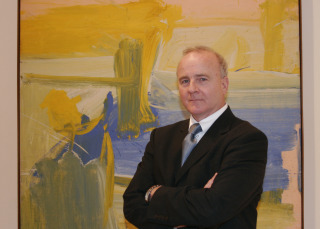If you aren’t tired of talking about deaccessioning, or listening to others talk about it — and I hope you are not! — please tune into to a program just posted on Rush Interactive on ArtonAir.org.
 The show is hosted by Michael Rush (right), who was director of the Rose Art Museum at Brandeis until last spring, when he was dismissed in the mess over the university’s plans to close the museum and sell its collection. A couple of Fridays ago, he convened a very civil discussion on the subject with writer/critic/curator Eleanor Heartney, Charles Desmarais, deputy director of the Brooklyn Museum (the reward for posting comments on this blog), and me.
The show is hosted by Michael Rush (right), who was director of the Rose Art Museum at Brandeis until last spring, when he was dismissed in the mess over the university’s plans to close the museum and sell its collection. A couple of Fridays ago, he convened a very civil discussion on the subject with writer/critic/curator Eleanor Heartney, Charles Desmarais, deputy director of the Brooklyn Museum (the reward for posting comments on this blog), and me.
Here’s the link.
This gives me an opportunity to post a few more impressions, based on developments and discussions since the publication of my op-ed in The New York Times on Jan. 2.
- It’s sad, but true, that several people on both sides of the issue told me that I was “brave” to propose something at odds with the official AAMD/AAM position. It was as if I had voluntarily touched the Third Rail of the museum world.
- This sentiment was borne out at the Brodsky bill roundtable: People are afraid to discuss the very possibility. There was almost no dissent (except for objections to an unfunded mandate) until, at 1 p.m., two hours after the Committee on Tourism, Parks, Arts and Sports convened the roundtable, Brodsky satisfyingly looked around and said it was the last chance for people who differed with him to speak up. Only then did people rise to the mike to disagree or question the bill, and only then did the rumbles in the audience begin.
- More troubling still, one thing I’ve learned since Jan. 2 is precisely how little trust exists in the museum world. Directors don’t trust their trustees; trustees don’t trust one another; many trustees don’t trust their directors. I knew there was some amount of mistrust — but I didn’t know relations were this bad.
- Museum directors — even some you think are strong — fear their trustees, finding it hard to disagree with the powerful ones, ever. (I know, I know, trustees provide the money, and directors work for the board, but absolute obeisance is unhealthy.)
- While it’s no secret that trustees join boards because they contribute money or art, too many trustees have little interest in art — maybe none. If they’re there only for the prestige and the power, I blame the nominating committee and the board chairman.
At the risk of sounding naive, I think we need to talk much more about museum governance. There are some parallels with corporate governance, about which I have written extensively, but not enough for me to make suggestions at the moment. More reporting, more discussion is in order.
Photo Credit: Dominic Chavez, Courtesy Boston Globe
